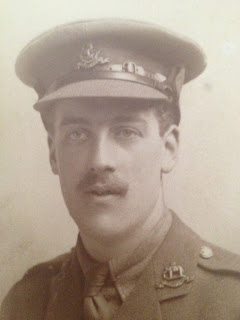Contact details
There seems to be a continuing issue with the 'Comment' feature on the site, so if you do wish to get in touch, you can always make contact via e-mail to greatwarworkshops@gmail.com
Tuesday, 7 November 2017
Thursday 8th November 1917
Monday, 6 November 2017
Wednesday 7th November 1917
Ptes. Isaac Raisman (see 30th
June) and John Yeates (see below) appeared before a Field
General Court Martial; both were charged with ‘actions contrary to the
maintenance of good order and military discipline’ (details unknown) and both
were convicted. Raisman would be ordered to undergo seven days’ Field
Punishment No.1 and Yeates 42 days. Pte. John Yeates was 26 years old
and originally from Pewsey, Wiltshire, but had enlisted in 1912 while working in Yorkshire.
He had been posted to France to join 2DWR in November 1914 and had been wounded
in December 1916, suffering gunshot wounds to his right thigh. In the absence
of a surviving service record it has not been possible to establish when, or
under what circumstances, he had joined 10DWR.
Pte. Oliver Rhodes (see 11th October), who had been in England for the previous three weeks, was discharged from hospital and posted to Northern Command Depot at Ripon.
Sunday, 5 November 2017
Tuesday 6th November 1917
 |
Pte. Fred Hargreaves (29267)
Image by kind permission of Patrick Hargreaves
|
Monday 5th November 1917
Pte. William Frederick Ackrill (see 28th
July), serving in France with 2DWR, was appointed Acting Lance Corporal (paid);
his appointment would be confirmed as permanent on 21st December.
 |
Capt. Bob Perks DSO
Image by kind permission of Janet Hudson
|
 |
| Capt. Adrian O'Donnell Pereira |
Friday, 3 November 2017
Sunday 4th November 1917
Thursday, 2 November 2017
Saturday 3rd November 1917
Wednesday, 1 November 2017
Friday 2nd November 1917
Pte. William Franklin (see 25th September) who had been in England after being wounded on 20th September, was discharged from hospital and posted to Northern Command Depot at Ripon.
Pte. Amor Green Brooke (see 5th July 1916) was formally discharged from the Army as no longer physically fit for service on account of wounds suffered in action. Having recovered from wounds suffered in July 1916 he had been transferred to 2DWR, but, in the absence of a surviving service record it has not been possible to establish any details as to when he had been wounded for a second time.
